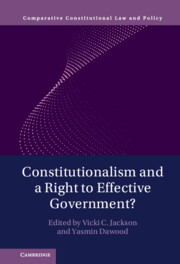35 results
1 - Constitutionalism and Effective Government
- from Part I - Introduction
-
-
- Book:
- Constitutionalism and a Right to Effective Government?
- Published online:
- 20 October 2022
- Print publication:
- 27 October 2022, pp 3-20
-
- Chapter
- Export citation
Part VI - Legislatures, Representation, and Duties of Effective Self-Government
-
- Book:
- Constitutionalism and a Right to Effective Government?
- Published online:
- 20 October 2022
- Print publication:
- 27 October 2022, pp 179-220
-
- Chapter
- Export citation
Dedication
-
- Book:
- Constitutionalism and a Right to Effective Government?
- Published online:
- 20 October 2022
- Print publication:
- 27 October 2022, pp ix-x
-
- Chapter
- Export citation
Part VII - Politics, Sociology, Media, and Corruption as Contexts for Constitutionalism and Governance
-
- Book:
- Constitutionalism and a Right to Effective Government?
- Published online:
- 20 October 2022
- Print publication:
- 27 October 2022, pp 221-252
-
- Chapter
- Export citation
Part III - Positive Rights and Rights to Effective Self-Government
-
- Book:
- Constitutionalism and a Right to Effective Government?
- Published online:
- 20 October 2022
- Print publication:
- 27 October 2022, pp 71-104
-
- Chapter
- Export citation
14 - Legislatures and Effective Government: Raising Expectations for Representatives
- from Part VI - Legislatures, Representation, and Duties of Effective Self-Government
-
-
- Book:
- Constitutionalism and a Right to Effective Government?
- Published online:
- 20 October 2022
- Print publication:
- 27 October 2022, pp 181-192
-
- Chapter
- Export citation
Part IV - The Role of Courts in Building State Capacity and Promoting Effective Self-Government While Protecting Rights
-
- Book:
- Constitutionalism and a Right to Effective Government?
- Published online:
- 20 October 2022
- Print publication:
- 27 October 2022, pp 105-150
-
- Chapter
- Export citation
Part II - What Are Constitutions For?
-
- Book:
- Constitutionalism and a Right to Effective Government?
- Published online:
- 20 October 2022
- Print publication:
- 27 October 2022, pp 21-70
-
- Chapter
- Export citation
Acknowledgments
-
- Book:
- Constitutionalism and a Right to Effective Government?
- Published online:
- 20 October 2022
- Print publication:
- 27 October 2022, pp xvii-xviii
-
- Chapter
- Export citation
Contributors
-
- Book:
- Constitutionalism and a Right to Effective Government?
- Published online:
- 20 October 2022
- Print publication:
- 27 October 2022, pp xv-xvi
-
- Chapter
- Export citation
Tables
-
- Book:
- Constitutionalism and a Right to Effective Government?
- Published online:
- 20 October 2022
- Print publication:
- 27 October 2022, pp xiv-xiv
-
- Chapter
- Export citation
Index
-
- Book:
- Constitutionalism and a Right to Effective Government?
- Published online:
- 20 October 2022
- Print publication:
- 27 October 2022, pp 253-262
-
- Chapter
- Export citation
Contents
-
- Book:
- Constitutionalism and a Right to Effective Government?
- Published online:
- 20 October 2022
- Print publication:
- 27 October 2022, pp xi-xiii
-
- Chapter
- Export citation
Copyright page
-
- Book:
- Constitutionalism and a Right to Effective Government?
- Published online:
- 20 October 2022
- Print publication:
- 27 October 2022, pp viii-viii
-
- Chapter
- Export citation
Part I - Introduction
-
- Book:
- Constitutionalism and a Right to Effective Government?
- Published online:
- 20 October 2022
- Print publication:
- 27 October 2022, pp 1-20
-
- Chapter
- Export citation
Part V - Executive and Administrative Constitutionalism in Effective Democratic Government
-
- Book:
- Constitutionalism and a Right to Effective Government?
- Published online:
- 20 October 2022
- Print publication:
- 27 October 2022, pp 151-178
-
- Chapter
- Export citation

Constitutionalism and a Right to Effective Government?
-
- Published online:
- 20 October 2022
- Print publication:
- 27 October 2022
5 - US Constitutional Law and History
- from Part II - Historical Experiences
-
-
- Book:
- The Cambridge Companion to Comparative Constitutional Law
- Published online:
- 30 September 2019
- Print publication:
- 03 October 2019, pp 113-140
-
- Chapter
- Export citation
Donald Kommers and Comparative Constitutional Law
-
- Journal:
- German Law Journal / Volume 20 / Issue 4 / May 2019
- Published online by Cambridge University Press:
- 24 June 2019, pp. 532-533
-
- Article
-
- You have access
- Open access
- HTML
- Export citation
Contributors
-
- Book:
- Proportionality
- Published online:
- 28 September 2017
- Print publication:
- 21 September 2017, pp v-vi
-
- Chapter
- Export citation



